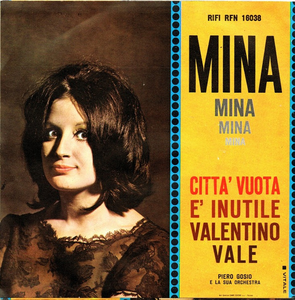
Adriano Celentano is an Italian singer-songwriter, actor, and filmmaker. He is dubbed Il Molleggiato because of his energetic dancing.

Mina Anna Maria Mazzini or Mina Anna Quaini, known mononymously as Mina, is an Italian singer and actress. She was a staple of television variety shows and a dominant figure in Italian pop music from the 1960s to the mid-1970s, known for her three-octave vocal range, the agility of her soprano voice, and her image as an emancipated woman.

Gino Paoli is an Italian singer-songwriter. He is a seminal figure who has written a number of songs widely regarded as classics in Italian popular music, including: "Il cielo in una stanza", "Che cosa c'è", "Senza fine", "Quattro amici al bar" and "Sapore di sale".

Giovanni "Gianni" Meccia is an Italian composer, singer-songwriter, record producer and actor. He is often associated with Jimmy Fontana.

Studio Uno is a studio album by Italian singer Mina, released in March 1965 by Ri-Fi. All songs were performed during the Saturday TV show Studio Uno. Thanks to such super hits as "Città vuota", "È l'uomo per me", "Un anno d'amore", "Un buco nella sabbia", "Io sono quel che sono" e "L'ultima occasione", the record reached the top of the Italian chart.

Italian singer Mina has released seventy-five studio albums, three live albums, forty-five official compilation albums, six video albums and seventeen extended plays. During her career, Mina has sold more than 150 million copies of her recordings worldwide.

Umberto Bindi was an Italian singer-songwriter. He is especially known for the popular song he co-wrote with Gino Paoli, Il Mio Mondo, which he recorded in Italian in 1963, and ''La musica è finita'' It was later performed by singers in English and other languages.

Tintarella di luna is the debut studio album by Italian singer Mina. It was released in March 1960, by Italdisc. Despite the fact that the songs contained on the album have previously been released on various singles and EPs, it is considered not a compilation album, but a debut album in the official discography of the singer.

Salomè is a double studio album by Italian singer Mina, released in November 1981 by PDU.

"Una casa in cima al mondo" is a 1966 Italian song composed by Vito Pallavicini and Pino Donaggio. The song premiered at the 16th edition of the Sanremo Music Festival, with a double performance by Donaggio and Claudio Villa, and placed at the fourth place.

Germana Caroli was an Italian singer, mainly active in the 1950s.

"Nessuno" is a 1959 Italian song composed by Antonietta De Simone and Edilio Capotosti. The song premiered at the ninth edition of the Sanremo Music Festival, with a double performance by Wilma De Angelis and Betty Curtis, and placed at the eighth place.

Italian singer Mina has released 158 official singles and 63 promotional singles.

"Città vuota" is a song recorded by Italian singer Mina in 1963. This song is Italian version of "It's a Lonely Town" by Gene McDaniels. The song was written by Doc Pomus, Mort Shuman, and adapted by Giuseppe Cassia.

"Tintarella di luna" is a song recorded by Italian singer Mina. It was written by Bruno De Filippi, at the time a member of the group I Campioni, and Franco Migliacci. The song became the first major hit for the singer. In Italy the song became number three in the chart, and its sales exceeded 200,000 copies.
"Due note" is a song recorded by Italian singer Mina. It was written by Bruno Canfora, Antonio Amurri, Raffaele Sposito, and the arrangement for the song was prepared by Tony De Vita. The song became the final theme of the 1960 television broadcast of Canzonissima, and the following year it was included in the album of the same name.

"Anche un uomo" is a song by Italian singer Mina, recorded for her studio album Attila. It was written by Anselmo Genovese, Mike Bongiorno, Ludovico Peregrini and Alberto Testa. "Anche un uomo" was released as a lead single in March 1979 and peaked at number 9 in its seventh week on the Italian chart. It was also used as a theme song of the game show Lascia o raddoppia? The song "Se il mio canto sei tu", which was written by Paola Blandi and Beppe Cantarelli, was used as a B-side.

"Vorrei che fosse amore" is a song written by Antonio Amurri and Bruno Canfora. Italian singer Mina recorded it in 1968 as the final theme of the musical TV show Canzonissima. The song was later included on her album Canzonissima '68, and was also released as a single, reaching number 9 on the Italian chart. According to Cash Box magazine, it was ranked 77th on the list of the best-selling singles in Italy between July 1968 and July 1969.

"Una canzone" is a song recorded by Italian singer Mina in collaboration with the band New Trolls. The song was written by the band members, the arrangement was made by Gianfranco Lombardi. The song was released as the lead single from the 1981 album Salomè, but the release was commercially unsuccessful, reaching only number 21 on the chart, which became Mina's lowest chart position of all time. The B-side was the song "Quando l'amore ti tocca", written by Ninni Carucci and Renato Di Bitonto.

















